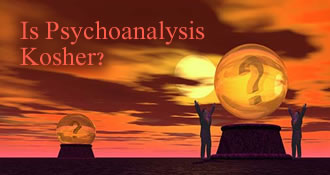
Question:
What is the traditional Jewish view on psychoanalysis? I'm particularly interested in the purported parallels between Freudian and Chabad philosophy.
Answer:
There have been many views expressed, ranging from enthusiastic embrace to unconditional condemnation. What follows is based on the Lubavitcher Rebbe's letters on the topic.
The Rebbe writes that psychoanalysis has helped people, but since Freud and his colleagues saw religion as something of an illness in itself, we must be careful in choosing the doctor to go to. You may have heard of Dr. Viktor Frankl, who wrote Mans Search for Meaning. The basis of Frankls theory was that the primary motivation of an individual is the search for meaning in life and that the primary purpose of psychotherapy should be to help the individual find that meaning. The Rebbe supports Frankls views over Freuds and bemoans the fact that the majority of psychotherapists have not followed in this path.
In other letters, the Rebbe agrees that there are many similarities between the Freudian model of the human psyche and that described by Rabbi Schneur Zalman in his highly original, yet traditional, classic work, the Tanya. The first book of the Tanya provides spiritual guidance, often describing intimately the inner workings of the human soul. All of this is based firmly on Talmud and other rabbinic writings-such as the works of Rabbi Moshe ben Maimon (Maimonides), Rabbi Yehuda Lowe of Prague (Marahal), Rabbi Yitzchak Luria (Ari), Rabbi Yeshaya Horowitz (Sheloh), and of course the oral teachings of the Baal Shem Tov and Maggid of Mezritch. Nevertheless, it stands out as the first literature to deal with the multiple facets and layers of human personality vividly and explicitly.
Furthermore, ethical literature beforehand had taken a generally behavioral approach: Do this, dont do that. Be like this, avoid being like that. If you dont, youll be sorry. Schneur Zalmans approach, which became known as "Chabad", is that our emotions and behavior are symptoms of what is happening with our mind. You cant direct the heart directly, he wrote, and even behavior is not truly changed by offering reward and threatening punishment. Rather, all true change must be affected by working the entire person, beginning with the inner mind.
This was also Freuds achievement, when he demonstrated that much illness can be traced to mental disorder. Freud also pioneered the concept of a multi-layered consciousness, with multiple forces pulling in different directions. The very words he used - ego (ich), superego and id - are strikingly similar to the G-dly soul, animal soul and person (guf) discussed in Tanya. Many other similarities could be discussed.
However, where Freud sees the underlying force within man as his sexual drive, the Tanya sees it as his G-dly soul. Thats a major difference with serious impact.
Furthermore, while Freud could only prescribe therapy through intervention of an objective practitioner, Schneur Zalman set down a clear path for the common man to work through on his own. We are all in control of our minds, he writes, to think about whatever we wish to think about. And then he lays out a prescription to develop a mindset that brings out the most essential and Divine qualities of the heart. Of course, the guidance and assistance of the tzaddik is vital to the process, but the principal work, Schneur Zalman stressed, lies on the shoulders of the individual wishing to improve.
Of course, Tanya was not meant as a remedy for psychosis. It was written for the common person who needs guidance in overcoming obstacles on his spiritual path. But the basics are all there, ready to be applied.
Several authors have dealt with the Jewish roots of Freuds ideas. Some even point to his fascination with the Kabbalah and his talks with Rabbi Shalom DovBer, the fifth rebbe of Chabad-Lubavitch. Others assert that most of what he theorized can easily be traced to common Jewish folk-knowledge.

